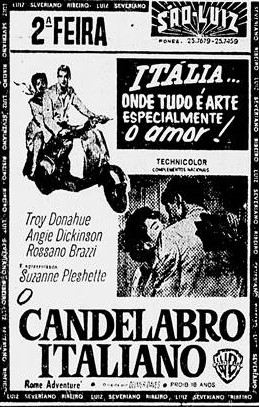Looking back at the chart action of Italian acts in Brazil during the so-called 'Italian invasion' (1963-1967) one can clearly see that Rita Pavone was the #1 act followed by Sergio Endrigo, Bobby Solo. Pino Donaggio and Nico Fidenco.
Nico Fidenco was actually the first act to break through the Brazilian charts with 'Legata a un granello di sabbia' in 1963.
Fidenco's first 2 albums sold a lot of copies and he had quite a few hits with 'Tutta la gente' (1963), 'Se mi perderai' (1964), 'Con te sulla spiaggia' (1964) and finally 'A casa d'Irene' in 1965.
Fidenco's first 2 albums sold a lot of copies and he had quite a few hits with 'Tutta la gente' (1963), 'Se mi perderai' (1964), 'Con te sulla spiaggia' (1964) and finally 'A casa d'Irene' in 1965.
by May 1965, the Italian wave was abating but Nico Fidenco went up the charts with 'A casa d'Irene' which tells the story of a mysterious brothel in a world resembling 'Blade runner'...
Nico Fidenco née Domenico Collarossi on 24 January 1933, in Rome. He made the grade circa 1961, when 'Legata a un granello di sabbia' went to #1 in Italy and crossed over to the European continent as well as Latin America.
1960 - What a Sky / Su nel cielo (RCA Serie Europa – PM45 1109)
1961 - Non è vero / Una voce d'angelo (RCA Serie Europa – PM45 1127)
1961 - Il mondo di Suzie Wong / Tornerai... Suzie (RCA Serie Europa – PM45 1144)
1961 - Legata a un granello di sabbia / Ridi, ridi (RCA Serie Europa – PM45 1166)
1962 - Tutta la gente / Lejos me voy (RCA Serie Europa – PM45 3133)
1963 - Una donna nel mondo / Perché non piango più (RCA Italiana – PM45 3167)
1963 - Tutta la gente / Mondo meraviglioso (RCA Serie Europa – PM45 3169)
1963 - Se mi perderai / Goccia di mare (RCA Italiana – PM45 3199)
1963 - Cleopatra / Non mi chiedi mai (RCA Italiana – PM45 3222)
1963 - Hud / Ciò che rimane alla fine di un amore (RCA Italiana – PM45 3224)
1964 - Con te sulla spiaggia / Mi devi credere (RCA Italiana – PM45 3255)
1964 - A casa d'Irene / Ma dai (RCA Italiana – PM45 3299)
1965 - L'uomo che non sapeva amare / Tu non sei l'altra (RCA Italiana – PM45 3311)
Nico Fidenco visits Brazil for the 2nd time; sings at Teatro Record from 12 to 16 May 1965.



































